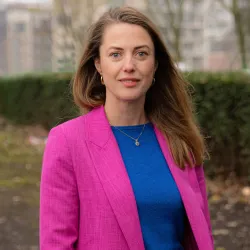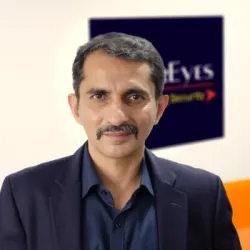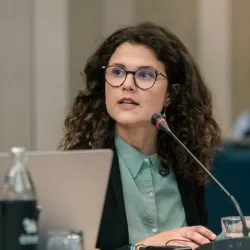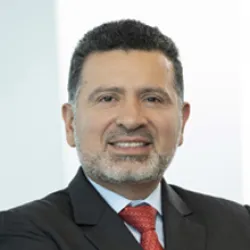Advanced ESG strategies for climate-responsive financial systems: central bank roles, risk management, and sustainable innovation
Advanced ESG strategies for climate-responsive financial systems: central bank roles, risk management, and sustainable innovation
Advanced ESG strategies for climate-responsive financial systems: central bank roles, risk management, and sustainable innovation
Date: October 28-29th
10:00am-1:30pm (EDT) | 2:00pm-5:30pm (GMT) | 3:00pm-6:30pm (CET) | 10:00pm-1:30am (SGT)
Location: Virtual
At the conclusion of the training, participants will be able to:
- Delegates will be able to understand the transmission of climate risks through financial systems and how central bank policies can mitigate these risks through regulation and monetary policy.
- Participants will learn how to successfully integrate ESG strategies into their central bank's operations, including harmonizing frameworks and aligning policies with climate goals.
- Learn best practices for climate risk disclosure and reporting, focusing on transparency, carbon footprint measurement, and ESG communication.
- Delegates will be taught how to harness technology and innovation (AI, IoT, green fintech) to support green finance and sustainable investments while managing cybersecurity risks.
Chair

Rianne Luijendijk
Team lead responsible investing
Dutch Central Bank
Rianne Luijendijk is Team Lead Responsible investing at the Dutch Central Bank. She is responsible for the development and implementation of DNB’s responsible investing approach for the own-account portfolios. She also chairs the sustainable and responsible investment workstream in the Network for Greening the Financial System, in which central banks and supervisors collaborate to advance their efforts to further integrate sustainability considerations in central bank’s portfolio management. Since 2020, the workstream has published a number of reports to assist central banks in their adoption of sustainable and responsible investment practices.
Speakers

Joaquim L Ribeiro Ferreira Leite
Head of climate finance
NDC Partnership
Joaquim is the Head of Climate Finance at the NDC Partnership. His work focuses on supporting NDC Partnership member countries in Africa, Asia, and Latin America in increasing access to climate finance to implement their Nationally Determined Contributions (NDCs) and the Sustainable Development Goals. Joaquim leads the finance team and manages the finance work of the NDC Partnership.
Before joining the NDC Partnership in 2017, Joaquim worked for more than ten years on diverse climate and sustainability-related projects in developing countries. His experience includes the: (i) ESG integration into high-level decision-making, investment portfolios, and management systems for leading organizations in the energy, mining, forestry, agriculture, and infrastructure sectors; (ii) design, implementation, and evaluation of sustainable investment projects for corporations and institutional investors; (iii) elaboration and implementation of Climate Change Programs, and (iv) development of CDM and REDD+ projects, GHG inventories, and tailored climate strategies for companies and governments.
His experience includes assignments to national and subnational Governments, the private sector, research institutions, bilateral donors, and multilateral organizations. Joaquim holds a bachelor's in Engineering with a concentration in Forestry and Ecosystems from the Federal University of Paraná (UFPR) in Brazil and a master's in International Development and Management from Lund University (Sweden). In his free time, he enjoys water sports, travelling, cycling, meditating, and listening to music.

Enrico Bernardini
Director, climate change and sustainability hub
Bank of Italy
Enrico Bernardini is Director at the Climate change and sustainability hub of the Bank of Italy. He is coordinator of the Bank’s contact group of experts and sustainability and climate-related topics. He’s a Bank’s representative in the workstream “Net Zero” of the Network for Greening the Financial System. He has contributed to the ESG integration into the Bank’s equity investment policy. He led the drafting teams for the Responsible Investment Charter and the first Report on sustainable investment and climate risks. Enrico has co-authored articles on the carbon transition risk of utilities’ investment, on machine learning for portfolio construction with ESG data and on central banking and sustainable finance. He was a member of the Bank’s Task Force on sustainable finance for the Italian Presidency of G20 in 2021. He has worked at the European Central Bank and at De Nederlandsche Bank. Enrico holds a PhD in Banking and Finance and a Msc in Asset Management.

Altin Tanku
Director, research department
Bank of Albania
Altin Tanku is the Director of the Research Department at the Bank of Albania. He holds a Ph.D. in Economics from the University of Wisconsin, Milwaukee. His research interests cover empirical studies in the field of monetary and international economics, as well as the econometric modelling of economic and financial phenomena. Altin serves as a member of the Monetary Policy Implementation Committee and the Foreign Exchange Reserve Investment Committee. As a director and economist, he is involved in several analytical and decision-making processes and is currently focused on the implementation of the Green Strategy and the Financial Education and Inclusion Strategy. He is the author and co-author of articles and studies focusing on monetary and international economics.
Altin has extensive experience at the Bank of Albania, starting in 1993 in the Monetary Policy and Statistics Department, where he held the position of Head of the Balance of Payments Sector until 2001. After completing his doctoral studies, he re-joined the Bank of Albania in the summer of 2006.

Karmendra Kohli
Co-founder and CEO
SecurEyes
Karmendra Kohli is a cybersecurity leader with over 23 years of experience in information/cyber security and information risk management. As the CEO and co-founder of SecurEyes, Karmendra has transformed a two-person start-up into a global cybersecurity company, known for delivering cutting-edge security solutions tailored to complex sectors such as finance, government, and healthcare.
With a Master's in Computer Applications and advanced certifications including CISSP, CISA, CRISC, and CISM, he combines technical expertise with a deep understanding of strategic business needs.
Under Karmendra's leadership, SecurEyes has become a trusted partner for over 700 clients across 12 countries, including prominent names in both the public and private sectors. His focus on operational excellence and client-centered solutions has driven the company to conduct more than 14,000 security assessments and gain accolades for several global projects.
A recognised figure in cybersecurity, Karmendra regularly speaks at prominent conferences, sharing insights on the evolving cyber threat landscape and innovations in cyber resilience. He has also served as an advisor to senior management and boards of directors, helping organizations shape their cybersecurity strategies in the face of a rapidly changing threat environment.
Karmendra’s mission is to empower organisations with secure, adaptive, and compliant digital ecosystems. He is passionate about fostering a culture of digital trust and resilience, particularly in critical infrastructure sectors. Looking forward, he aims to further SecurEyes’ global reach, supporting enterprises and governments in their cybersecurity transformation journeys while developing future leaders in the information security industry.

Valentina Bellesi
Policy analyst
OECD Environment Directorate
Valentina Bellesi is a Policy Analyst in the Green Finance and Investment team at the OECD Environment Directorate, where she leads and conducts research and analysis on green and clean energy finance and investment as well as on corporate transition plans and broader climate-related disclosures. Amongst others, Valentina co-authored the OECD Guidance on Transition Finance, which focuses on ensuring the credibility of corporate climate transition plans, and contributed to the work of the G20 Sustainable Finance Working Group (SFWG). Valentina also coordinates and manages the annual flagship OECD Forum on Green Finance and Investment. Prior to this, Valentina co-authored several publications on blended finance, impact investing and multilateral development finance, at the OECD Development Co-operation Directorate. She also has experience in impact evaluation, having worked at the Evaluation Department of the Council of Europe Development Bank and as an impact evaluation research assistant at the Institute of Latin American Studies. She holds a Master’s degree in International Development from Sciences Po Paris and a Bachelor in Economics and Finance from Bocconi University.

Eric Bouyé
Manager of product, knowledge and research
World Bank Treasury
Eric Bouyé is Manager of the Product, Knowledge and Research team, which is responsible for supporting Treasury clients, including capacity building for the Reserve Advisory and Management Partnership (RAMP). He is a member of the leadership team of the Asset Management and Advisory Department, in charge of managing $70 billion assets and providing advisory and training for 75 clients consisting of central banks, public pension funds, sovereign wealth funds, trust funds, and other official institutions.
Eric has 22 years of asset management and capital markets experience. Prior to joining the Bank, Eric was Senior Strategist at the Fonds de Réserve pour les Retraites (FRR). He was previously Director, Investment Products and Strategies, and, Director, Structuring Team for Asia, based in Tokyo, at Sociéte Générale.
Eric holds a Ph.D. in Finance from Bayes Business School, University of London, a Magistere in International Economics and Finance from University of Bordeaux, and a MSc. in Banking and Finance from University of Birmingham. He has been Adjunct Professor in different universities, including Sorbonne, the University of Paris.

Marco Ruiz
Manager of advisory and partnerships
World Bank Treasury
Marco Ruiz is the Manager of the Advisory & Partnership team within the Asset Management & Advisory Department. The team is responsible for managing the engagement with member institutions of the Reserve Advisory and Management Partnership (RAMP) and coordinating the delivery of training and advisory to improve asset management practices in official institutions. From 2018 to early 2023, Marco was a Senior Financial Officer in the team, managing the engagements with a group of RAMP members.
Prior to joining the World Bank in 2018, he worked for the Central Bank of Colombia for almost two decades, managing the country’s foreign reserves and sovereign wealth funds. He started his career as a portfolio manager, was promoted to Head of Portfolio Management, and later became Director of International Investment. In this last position, he received the Reserve Manager of the Year award from Central Banking Publications in 2014.
He holds a bachelor’s degree in economics from Universidad de los Andes in Bogota and a Master of Business Administration from New York University, and is a CFA charter holder.

Victor Smid
Responsible investment expert
Dutch Central Bank
Victor Smid is a Responsible Investment Expert at the Dutch Central Bank, where he is responsible for the development and implementation of responsible investment policies for the bank’s own funds. Currently, he is spearheading efforts focused on nature and biodiversity. Victor is also an active member of several international task forces on integrating responsible investing techniques, including for the NGFS and the Eurosystem. He previously worked at a Dutch corporate bank and an impact investment firm, and holds Master’s degrees from the Stockholm School of Economics and Leiden University.
Agenda
14:00 – 14:30
Course introduction and overview
14:00 - 14:45
- Outlining the course goals, and the relevance of central bank roles in climate and financial stability
- Evolving mandate of central banks and the integration of climate-related financial risks
- Why should your central bank address climate risk, why is it relevant, and what core functions do you want to target?
- Role of central banks vs. other financial institutions and government bodies
- Overview of key concepts: ESG, green finance, financial stability and political challenges
Rianne Luijendijk is Team Lead Responsible investing at the Dutch Central Bank. She is responsible for the development and implementation of DNB’s responsible investing approach for the own-account portfolios. She also chairs the sustainable and responsible investment workstream in the Network for Greening the Financial System, in which central banks and supervisors collaborate to advance their efforts to further integrate sustainability considerations in central bank’s portfolio management. Since 2020, the workstream has published a number of reports to assist central banks in their adoption of sustainable and responsible investment practices.
14:30 – 15:30
Transmission channels and central bank responses: analysing impacts on financial systems
14:45 - 15:45
- Identify climate risk transmission channels, both within the central bank and the institutions which are being regulated, and their financial implications
- Examine the role of financial regulation and central bank policy in mitigating climate-related financial risks
- Discuss the integration of climate risk into financial stability assessments and monetary policy frameworks (metrics and tools)
Altin Tanku is the Director of the Research Department at the Bank of Albania. He holds a Ph.D. in Economics from the University of Wisconsin, Milwaukee. His research interests cover empirical studies in the field of monetary and international economics, as well as the econometric modelling of economic and financial phenomena. Altin serves as a member of the Monetary Policy Implementation Committee and the Foreign Exchange Reserve Investment Committee. As a director and economist, he is involved in several analytical and decision-making processes and is currently focused on the implementation of the Green Strategy and the Financial Education and Inclusion Strategy. He is the author and co-author of articles and studies focusing on monetary and international economics.
Altin has extensive experience at the Bank of Albania, starting in 1993 in the Monetary Policy and Statistics Department, where he held the position of Head of the Balance of Payments Sector until 2001. After completing his doctoral studies, he re-joined the Bank of Albania in the summer of 2006.
15:30 – 15:40
Coffee break
15:45 - 16:00
15:40 – 16:40
Integrating ESG in central bank operations: framework development, policy alignment, and regulatory strategies
15:40 - 16:40
- Developing and implementing an internal ESG framework
- Harmonising ESG frameworks with existing green policies
- Strategies for embedding ESG into supervisory and regulatory practices
Valentina Bellesi is a Policy Analyst in the Green Finance and Investment team at the OECD Environment Directorate, where she leads and conducts research and analysis on green and clean energy finance and investment as well as on corporate transition plans and broader climate-related disclosures. Amongst others, Valentina co-authored the OECD Guidance on Transition Finance, which focuses on ensuring the credibility of corporate climate transition plans, and contributed to the work of the G20 Sustainable Finance Working Group (SFWG). Valentina also coordinates and manages the annual flagship OECD Forum on Green Finance and Investment. Prior to this, Valentina co-authored several publications on blended finance, impact investing and multilateral development finance, at the OECD Development Co-operation Directorate. She also has experience in impact evaluation, having worked at the Evaluation Department of the Council of Europe Development Bank and as an impact evaluation research assistant at the Institute of Latin American Studies. She holds a Master’s degree in International Development from Sciences Po Paris and a Bachelor in Economics and Finance from Bocconi University.
16:40 – 17:25
Transparent climate risk management: best practices in disclosure, reporting and communication
15:45 - 16:30
- Learn key methodologies for accurately measuring and reporting carbon footprints, aligning with global standards
- Explore best practices for ESG reporting, focusing on frameworks like TCFD and GRI for effective stakeholder communication
- Develop strategies to enhance transparency in climate risk and ESG disclosures, ensuring consistent and clear messaging, both internally and externally
Victor Smid is a Responsible Investment Expert at the Dutch Central Bank, where he is responsible for the development and implementation of responsible investment policies for the bank’s own funds. Currently, he is spearheading efforts focused on nature and biodiversity. Victor is also an active member of several international task forces on integrating responsible investing techniques, including for the NGFS and the Eurosystem. He previously worked at a Dutch corporate bank and an impact investment firm, and holds Master’s degrees from the Stockholm School of Economics and Leiden University.
17:25 – 17:30
Chair closing statement
16:00 - 16:45
- A brief overview of the days key ideas
Rianne Luijendijk is Team Lead Responsible investing at the Dutch Central Bank. She is responsible for the development and implementation of DNB’s responsible investing approach for the own-account portfolios. She also chairs the sustainable and responsible investment workstream in the Network for Greening the Financial System, in which central banks and supervisors collaborate to advance their efforts to further integrate sustainability considerations in central bank’s portfolio management. Since 2020, the workstream has published a number of reports to assist central banks in their adoption of sustainable and responsible investment practices.
14:00 – 15:00
Considering climate-related risks and transition impact in sovereign investments of central banks
14:00 - 15:00
- Discuss the importance of climate-related risks in sovereign investments
- Examine metrics and tools for assessing transition impacts
- Explore implementation challenges and best practices for central banks
Eric Bouyé is Manager of the Product, Knowledge and Research team, which is responsible for supporting Treasury clients, including capacity building for the Reserve Advisory and Management Partnership (RAMP). He is a member of the leadership team of the Asset Management and Advisory Department, in charge of managing $70 billion assets and providing advisory and training for 75 clients consisting of central banks, public pension funds, sovereign wealth funds, trust funds, and other official institutions.
Eric has 22 years of asset management and capital markets experience. Prior to joining the Bank, Eric was Senior Strategist at the Fonds de Réserve pour les Retraites (FRR). He was previously Director, Investment Products and Strategies, and, Director, Structuring Team for Asia, based in Tokyo, at Sociéte Générale.
Eric holds a Ph.D. in Finance from Bayes Business School, University of London, a Magistere in International Economics and Finance from University of Bordeaux, and a MSc. in Banking and Finance from University of Birmingham. He has been Adjunct Professor in different universities, including Sorbonne, the University of Paris.
Marco Ruiz is the Manager of the Advisory & Partnership team within the Asset Management & Advisory Department. The team is responsible for managing the engagement with member institutions of the Reserve Advisory and Management Partnership (RAMP) and coordinating the delivery of training and advisory to improve asset management practices in official institutions. From 2018 to early 2023, Marco was a Senior Financial Officer in the team, managing the engagements with a group of RAMP members.
Prior to joining the World Bank in 2018, he worked for the Central Bank of Colombia for almost two decades, managing the country’s foreign reserves and sovereign wealth funds. He started his career as a portfolio manager, was promoted to Head of Portfolio Management, and later became Director of International Investment. In this last position, he received the Reserve Manager of the Year award from Central Banking Publications in 2014.
He holds a bachelor’s degree in economics from Universidad de los Andes in Bogota and a Master of Business Administration from New York University, and is a CFA charter holder.
15:00 – 15:30
Sustainable bonds and investments: fundamentals, central bank roles, and global initiatives
16:30 - 17:00
- Fundamentals of green bonds and sustainable investment for central banks
- Role of central banks in promoting transparency and efficiency in sustainable finance
- Overview of international cooperation among central banks on green finance
Enrico Bernardini is Director at the Climate change and sustainability hub of the Bank of Italy. He is coordinator of the Bank’s contact group of experts and sustainability and climate-related topics. He’s a Bank’s representative in the workstream “Net Zero” of the Network for Greening the Financial System. He has contributed to the ESG integration into the Bank’s equity investment policy. He led the drafting teams for the Responsible Investment Charter and the first Report on sustainable investment and climate risks. Enrico has co-authored articles on the carbon transition risk of utilities’ investment, on machine learning for portfolio construction with ESG data and on central banking and sustainable finance. He was a member of the Bank’s Task Force on sustainable finance for the Italian Presidency of G20 in 2021. He has worked at the European Central Bank and at De Nederlandsche Bank. Enrico holds a PhD in Banking and Finance and a Msc in Asset Management.
15:30 – 16:15
Harnessing technology and innovation for advancing green finance
15:00 - 15:45
- Explore the use of IoT, AI and digital technologies in gathering and analysing climate data
- Learn about strategies for financing climate technology and fostering a vibrant fintech ecosystem
- Discover the latest trends in green fintech and their potential to reshape the financial sector
Karmendra Kohli is a cybersecurity leader with over 23 years of experience in information/cyber security and information risk management. As the CEO and co-founder of SecurEyes, Karmendra has transformed a two-person start-up into a global cybersecurity company, known for delivering cutting-edge security solutions tailored to complex sectors such as finance, government, and healthcare.
With a Master's in Computer Applications and advanced certifications including CISSP, CISA, CRISC, and CISM, he combines technical expertise with a deep understanding of strategic business needs.
Under Karmendra's leadership, SecurEyes has become a trusted partner for over 700 clients across 12 countries, including prominent names in both the public and private sectors. His focus on operational excellence and client-centered solutions has driven the company to conduct more than 14,000 security assessments and gain accolades for several global projects.
A recognised figure in cybersecurity, Karmendra regularly speaks at prominent conferences, sharing insights on the evolving cyber threat landscape and innovations in cyber resilience. He has also served as an advisor to senior management and boards of directors, helping organizations shape their cybersecurity strategies in the face of a rapidly changing threat environment.
Karmendra’s mission is to empower organisations with secure, adaptive, and compliant digital ecosystems. He is passionate about fostering a culture of digital trust and resilience, particularly in critical infrastructure sectors. Looking forward, he aims to further SecurEyes’ global reach, supporting enterprises and governments in their cybersecurity transformation journeys while developing future leaders in the information security industry.
16:15 – 16:30
Coffee break
15:30 - 15:45
16:30 – 17:00
Empowering central banks for climate action: Advancing sustainable finance and national climate plans
15:00 - 15:30
- Explore Nationally Determined Contributions (NDCs) as strategic frameworks for climate action and sustainable development in 90+ developing countries, with the next round of NDCs due next year
- Building capacity within central banks and financial regulators to advance sustainable finance and address climate risks.
- Insights on how central banks are fostering green finance, climate finance, and environmental, social, and governance (ESG) initiatives to improve the financial sector’s contribution to low carbon and climate-resilient development.
- Exploring the unique role central banks and financial regulators play in advancing sustainable finance and addressing climate risks.
Joaquim is the Head of Climate Finance at the NDC Partnership. His work focuses on supporting NDC Partnership member countries in Africa, Asia, and Latin America in increasing access to climate finance to implement their Nationally Determined Contributions (NDCs) and the Sustainable Development Goals. Joaquim leads the finance team and manages the finance work of the NDC Partnership.
Before joining the NDC Partnership in 2017, Joaquim worked for more than ten years on diverse climate and sustainability-related projects in developing countries. His experience includes the: (i) ESG integration into high-level decision-making, investment portfolios, and management systems for leading organizations in the energy, mining, forestry, agriculture, and infrastructure sectors; (ii) design, implementation, and evaluation of sustainable investment projects for corporations and institutional investors; (iii) elaboration and implementation of Climate Change Programs, and (iv) development of CDM and REDD+ projects, GHG inventories, and tailored climate strategies for companies and governments.
His experience includes assignments to national and subnational Governments, the private sector, research institutions, bilateral donors, and multilateral organizations. Joaquim holds a bachelor's in Engineering with a concentration in Forestry and Ecosystems from the Federal University of Paraná (UFPR) in Brazil and a master's in International Development and Management from Lund University (Sweden). In his free time, he enjoys water sports, travelling, cycling, meditating, and listening to music.
17:00 – 17:30
Chair wrap-up and outlook
16:30 - 17:00
- Summary of the course and key takeaways
- Discussion of the observed trends and case studies
- Preparation of action points
Rianne Luijendijk is Team Lead Responsible investing at the Dutch Central Bank. She is responsible for the development and implementation of DNB’s responsible investing approach for the own-account portfolios. She also chairs the sustainable and responsible investment workstream in the Network for Greening the Financial System, in which central banks and supervisors collaborate to advance their efforts to further integrate sustainability considerations in central bank’s portfolio management. Since 2020, the workstream has published a number of reports to assist central banks in their adoption of sustainable and responsible investment practices.